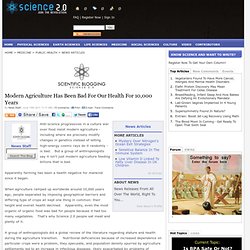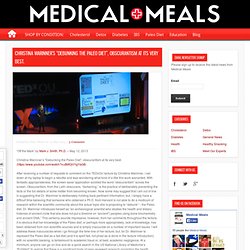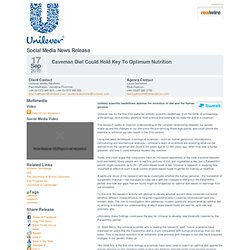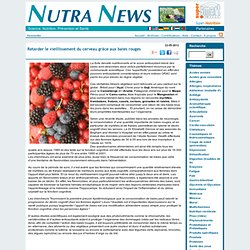

Doctor Cures Her Multiple Sclerosis With Diet, Abandons Wheelchair. L'alimentation "Paleo" Modern Agriculture Has Been Bad For Our Health For 10,000 Years. Anti-science progressives in a culture war over food insist modern agriculture - including where we precisely modify changes in genetics instead of letting high-energy cosmic rays do it randomly - is bad.

But a group of anthropologists say it isn't just modern agriculture feeding billions that is bad. Apparently farming has been a health negative for mankind since it began. When agriculture ramped up worldwide around 10,000 years ago, people separated by imposing geographical barriers and differing type of crops all kept one thing in common: their height and overall health declined. Apparently, even the most organic of organic food was bad for people because it had too many vegetables. That's why Science 2.0 people eat meat and plenty of it. A group of anthropologists did a global review of the literature regarding stature and health during the agriculture transition.
Obviously that changed over time and average heights and health for most populations began increasing. Www.soilandhealth.org/01aglibrary/010146tsoc.pdf. Dr Mark Smith Rebuttal To Dr Christina Warinner TEDxOU Presentation. Posted by Chris Thrive on 14 May 2013 / 3 Comments “Off the Mark” by Mark J.

Smith, Ph.D. – May 12, 2013 Christina Warinner’s “Debunking the Paleo Diet”, obscurantism at its very best. ( After receiving a number of requests to comment on the TEDxOU lecture by Christina Warinner, I sat down at my laptop to begin a rebuttal and was wondering what kind of a title this work warranted.
At the time of writing this rebuttal, Dr. I have been involved with the Paleo diet for the better part of 25 years (usually considered a little longer than a fad time-frame) and have researched, written, and presented about the Paleo diet and; perhaps even more importantly, worked clinically with individuals who have benefitted from adopting this way of eating. Debunking the paleo diet: Christina Warinner at TEDxOU.
Paleo_food_pyramid.jpg (1000×1066) Les forêts et la santé humaine. E. Dounias et A. Froment Edmond Dounias et Alain Froment sont des scientifiques travaillant à l’Institut français de recherche pour le développement (IRD, ex ORSTOM). Edmond Dounias est également affecté au Centre pour la recherche forestière internationale (CIFOR), Bogor, Indonésie. Le régime alimentaire et la santé sont des indicateurs sensibles des réactions humaines d’adaptation au changement. L’avenir des écosystèmes forestiers est inséparable de celui des populations qui vivent dans ces forêts. Les changements de régime alimentaire et l’exposition à de nouvelles maladies sont des indicateurs sensibles des coûts écologiques et culturels que les anciens chasseurs-cueilleurs supportent pour obtenir leur part de modernité.
Le présent article examine les changements de régime alimentaire et d’état de santé qui se produisent lorsque les habitants nomades de la forêt se sédentarisent. Experiencepaleo. Caveman Diet Could Hold Key To Optimum Nutrition. Tweet Unlikely scientific bedfellows address the evolution of diet and the human genome Unilever has for the first time gathered unlikely scientific bedfellows from the fields of archaeology, anthropology, evolutionary genetics, food science and botany to recreate the diet of a caveman.

The research seeks to improve understanding of the complex relationship between our genetic make-up and the changes to our diet since the pre-farming Stone Age period, and could unlock the potential to enhance our own health in the 21st century. Using the latest techniques in biological sciences – such as human genomics, microbiomics, cellculturing and biochemical analysis – Unilever’s team of scientists are exploring what can be learned from the caveman diet (from 2.5m years ago to 12,000 years ago, when man was a hunter gatherer) and how it could enhance modern day nutrition.
Today one could argue that consumers have an increased awareness of the route travelled between food and health. Scientists Learn Nutrition Secrets From Cavemen Diet. November 24, 2010 | 284,326 views Share Scientists have begun exploring what can be learned from the diet of cavemen who lived ago, based on vegetables, fruit, nuts, roots and meat.

Cereals, potatoes, bread and milk were not featured at all. Retarder le vieillissement du cerveau grâce aux baies rouges - Phytonutriments. La forte densité nutritionnelle et le score antioxydant élevé des baies sont désormais deux vertus parfaitement reconnus par la communauté scientifique.

Ces "superfruits" possèdent en effet des pouvoirs antioxydants considérables et leurs indices ORAC sont parmi les plus élevés du règne végétal. Ces véritables trésors végétaux sont retrouvés un peu partout sur le globe : Brésil pour l’Açaï, Chine pour le Goji, Amérique du nord pour la Canneberge et l’Aronia, Patagonie chilienne pour le Maqui, Pérou pour le Camu camu, Asie tropicale pour le Mangoustan et plus communément dans nos régions on rencontre myrtilles, framboises, fraises, cassis, cerises, grenades et raisins. Mais il est souvent compliqué de consommer une ration de ces baies tous les jours dans les assiettes… Et pourtant, on ne cesse de démontrer leurs propriétés bienfaisantes sur l’organisme. Www.direct-ms.org/pdf/EvolutionPaleolithic/Cereal Sword.pdf. College of Applied Human Sciences. Enzimologia.fcien.edu.uy/BQII 2011/Bibliografia BQII 2011/Hunter-gatherer Mayo Clin Proc 2004.pdf.
Loren Cordain - Origins and Evolution of the Western Diet: Health Implications for the 21st Century.